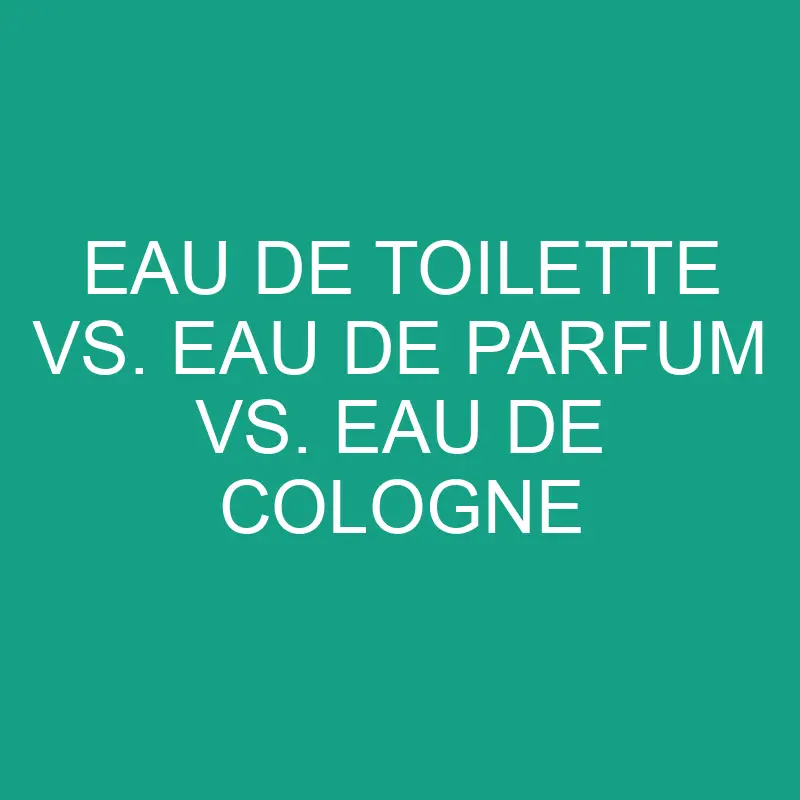Unveiling Fragrance Intensity
The world of perfumery is a realm of scents, notes, and intensities. When it comes to choosing a fragrance, the terms “Eau de Toilette,” “Eau de Parfum,” and “Eau de Cologne” often grace the labels of perfumes. These classifications are not just fancy French names but indicators of the concentration of aromatic compounds in the fragrance. Let’s delve into the distinctions between Eau de Toilette (EDT), Eau de Parfum (EDP), and Eau de Cologne (EDC) to unravel the layers of olfactory artistry.
Post Contents
1. Eau de Toilette (EDT): The Light Essence
Composition:
Eau de Toilette typically contains a lower concentration of aromatic compounds, usually ranging between 5% to 15%. This lighter formulation includes a mix of water and alcohol.
Intensity:
EDT offers a moderate intensity of fragrance. It is noticeable but tends to be lighter and less persistent compared to Eau de Parfum.
Longevity:
The scent of Eau de Toilette lasts for a moderate duration, often around 2 to 4 hours. Reapplication may be necessary throughout the day.
Best Use:
Ideal for daytime wear and casual occasions, Eau de Toilette is favored for its fresh and invigorating notes that don’t overwhelm.
2. Eau de Parfum (EDP): The Intense Symphony
Composition:
Eau de Parfum boasts a higher concentration of aromatic compounds, usually ranging from 15% to 20%. The formulation includes a greater proportion of essential oils.
Intensity:
EDP offers a more intense and richer fragrance experience. The higher concentration of oils contributes to a more complex and enduring scent.
Longevity:
The fragrance of Eau de Parfum lasts longer than Eau de Toilette, often lingering for 4 to 8 hours or more. It has a more sustained presence on the skin.
Best Use:
Eau de Parfum is suitable for both daytime and evening wear. It is favored for special occasions and events where a more enduring fragrance is desired.
3. Eau de Cologne (EDC): The Refreshing Zephyr
Composition:
Eau de Cologne has the lightest concentration among the three, typically ranging from 2% to 4%. It includes a higher proportion of water and alcohol, making it a refreshing and subtle formulation.
Intensity:
EDC provides the lightest and most delicate fragrance experience. It is often chosen for its breezy and invigorating notes.
Longevity:
The scent of Eau de Cologne is the most fleeting, lasting for a short duration of 1 to 3 hours. It is designed to offer a quick burst of freshness.
Best Use:
Eau de Cologne is best suited for casual and daytime wear. It is a popular choice for a quick, revitalizing spritz during warmer seasons.
Choosing the Right Fragrance: Factors to Consider
1. Occasion:
- Eau de Toilette: Casual and daytime wear.
- Eau de Parfum: Versatile, suitable for both daytime and evening events.
- Eau de Cologne: Casual and refreshing, ideal for daytime use.
2. Season:
- Eau de Toilette: All seasons, especially warmer months.
- Eau de Parfum: Suitable for all seasons, with a more enduring presence in colder weather.
- Eau de Cologne: Particularly refreshing in warm weather.
3. Personal Preference:
- Eau de Toilette: If you prefer a lighter, more subtle fragrance.
- Eau de Parfum: For those who appreciate a more intense and lasting scent.
- Eau de Cologne: If you enjoy refreshing, brisk fragrances with a short duration.
4. Skin Type:
- Fragrance may interact differently with various skin types. It’s advisable to test a fragrance on your skin before making a purchase.
Conclusion: The Olfactory Symphony
Choosing between Eau de Toilette, Eau de Parfum, and Eau de Cologne is akin to selecting the notes of a symphony that harmonize with your personality and style. The concentration of aromatic compounds not only affects the intensity and longevity of the fragrance but also influences how it unfolds on your skin.
Whether you opt for the light and casual charm of Eau de Toilette, the rich and enduring allure of Eau de Parfum, or the brisk and refreshing zephyr of Eau de Cologne, each category contributes to the vast and nuanced world of scents. The choice ultimately lies in your personal preferences, the occasion, and the sensory journey you wish to embark on with each spritz. As you explore the fragrance spectrum, let your olfactory senses guide you through this captivating world of perfumery.
